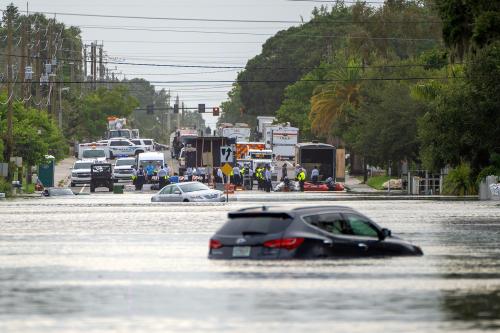In 2007, Brookings created a list of the top 10 global economic challenges to help inform policy-makers. Brookings Vice President Lael Brainard outlines the most pressing issues.
TRANSCRIPT
“This year for the first time Brookings will be releasing a list of the top 10 global economic challenges. The intention of this list is to help inform policymakers as to what those longer-term challenges are and to give them some ideas about concrete policy recommendations they can take to address them.
“We asked the experts and they gave us a ranking of what they saw as the top 10 global economic challenges for 2007. Not surprisingly, energy and environmental security were right up at the top of that list. Conflict and global poverty were very high on that list. Youth exclusion in the Middle East were very high up on that list
“What the hope is among this group of Brookings experts is that there’s some long-term challenges that are the most important challenges facing our nation and facing many of the other leading nations in the world, and that those most important challenges tend to get squeezed out by the kind of urgent challenges.
“So, for instance, one of the most important long-term challenges that we think we need to rise to as a nation and then as a global community is to address climate change. And also to address the kind of dysfunctional geopolitical situations that arise from excessive dependence on oil supplied by states in parts of the world that are not well governed. So that set of issues, that complex of issues, we feel kind of comes and goes. When the price of oil is three dollars a day, people suddenly get worked up about energy security, and when it drops down below two-fifty, it’s suddenly off the agenda again. But people who work on this issue think that we should be thinking about that day in and day out, so we are trying to get it very high on the agenda.
“Same thing goes for conflict and poverty. Increasingly, I think there is appreciation among people who are deep in the trenches on these issues that conflict that seems far afield is both very immediate, in terms of Americans need to get involved, and also exposure to potential cross-border spillovers, and that that conflict is very often rooted, not in some kind of ancient ethnic hatred, which is what the newspapers always kind of like to write about, but rather in the basic things that have to do with fundamental economic insecurity and vulnerability to drought, for instance, to environmental degradation that leads to big drops in income and leads to big drops in health and security, and can spiral into conflict.
“We will reassess the landscape in a year’s time and see whether new challenges that we hadn’t really noticed have cropped up to number one or two on the radar screen, or whether there is a set of these challenges that remain with us from year to year because they’re not being adequately grappled with. So I think we are interested to see how stable that set of challenges is a year from now, two years from now, and hopefully we’ll be moving some of them off that agenda.”
The Brookings Institution is committed to quality, independence, and impact.
We are supported by a diverse array of funders. In line with our values and policies, each Brookings publication represents the sole views of its author(s).


Commentary
Top 10 Global Economic Challenges
February 20, 2007